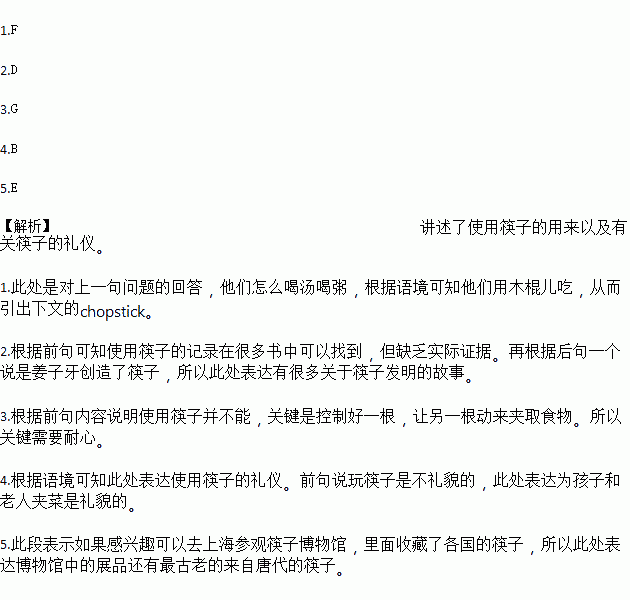题目内容
In fact, before the invention of chopsticks, Chinese ancestors actually used hands to eat, but how did they eat soup and porridge? 1. Chinese started to use chopsticks about 3,000 years ago in Shang Dynasty.
The records of using chopsticks have been found in many written books but lack physical evidence. 2. One says that Jiang Ziya, an ancient wise man, created chopsticks. There also go around some other stories. But there is no exact history record about the invention. We can only say that smart ancient Chinese invented chopsticks.
Using two slim sticks to pick up food is actually not difficult. You can do it if you practice it for some time, even if you are a foreigner. The key to managing chopsticks is keeping one chopstick in position while moving the other to pick up food. 3. Chopsticks are usually held in the right hand, and left-handed chopstick use is considered as improper in China. Playing with chopsticks is thought to be impolite. 4. Chinese philosopher Confucius advised people to use chopsticks instead of knives because the metal knives remind people of cold weapons, which mean killing and violence.
If you are truly interested in chopsticks, you can pay a visit to the Shanghai Chopsticks Museum. The museum gathered more than 1,200 pairs of chopsticks from China, Korea, Japan and Thailand. 5.
A. Chopsticks were introduced to many other neighbor countries due to its lightness and convenience.
B. It is considered to be polite and thoughtful to pick up food for the elderly and children.
C. Bamboo chopsticks are most frequently used in Chinese daily life.
D. However many stories are about the invention of chopsticks.
E. The oldest one was from the Tang Dynasty.
F. They had to use sticks to eat them.
G Remember to practice with patience.
 综合自测系列答案
综合自测系列答案
